Australian emergency nurse Jean-Philippe Miller has been deployed to Gaza three times with Australian Red Cross since early 2024. Amid the escalating humanitarian crisis, he talks of the need of adherence to International Humanitarian Law.
Jean-Philippe spent 36 days in Gaza in February 2024, 42 days in September to November 2024, and more recently 49 days in March-May 2025 in which he says was most confronting.
“The situation in Gaza continues to deteriorate. Staff are exhausted after 20 months of devastating conflict, and around 80% of the strip is now under displacement orders. The hostilities have increased in the south to the point where hospitals have mass casualty incidents almost every day or every second day.
“Most patients have penetrating trauma – gunshot wounds, shrapnel wounds, explosive blast injuries – or sometimes blunt trauma crush injuries, generally from a blast wave or falling debris.
“Medical staff are fatigued, exhausted, and struggling to access basic materials and food and provide for their own families. They’re displaced. Not only now, but they’ve been displaced many times living in tents with no electricity and no running water. You just really hope for a reprieve and that things can start to improve.”
Holding a Bachelor of Nursing, a postgraduate Certificate in Critical Care, and a Master’s degree in Public Health, Jean-Philippe has been a delegate with Australian Red Cross since 2014, deploying with the International Committee of the Red Cross (ICRC). Despite deployments with the Red Cross to South Sudan, Bangladesh, Myanmar, Syria, Papua New Guinea and Nigeria, he says the deployment to Gaza was nothing like he had experienced before.
“It’s definitely the most dangerous place in the world right now. I’ve deployed with Red Cross 14 times over the last 10 years to different kind of crises, refugee settings and conflict areas. Gaza is the most extensive security briefing I’ve ever had. It’s active conflict, it’s incredibly insecure.
“You’re hearing gunfire, you’re hearing and feeling explosions, the buildings shake and the windows rattle. The dangers have significant ramifications for our work. Security can override clinical care. That means you have to stop activities suddenly to make sure that you remain safe and that can put patient care at risk.
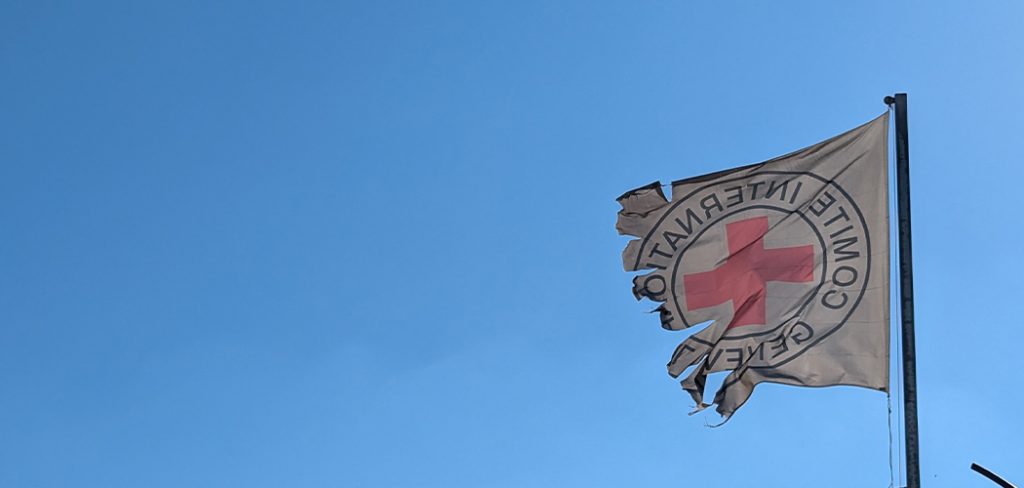
“There’s often new evacuation zones being announced, which impacts travel. Sometimes our staff are unable to reach the hospital due to active hostilities or risk. All our staff are displaced. They’ve been displaced many times, and they’ve got families, so sometimes they have to prioritise their family.
“The dangers also have impacts as far as access to healthcare, not just for our staff, but for ambulances where their movements can be restricted. It was quite common that patients’ presentation to hospital would be delayed. I have no doubt that some patients died because they were unable to reach hospital because they couldn’t get there or an ambulance could not reach them.”
Healthcare crisis
Jean-Philippe was first deployed to the European Gaza Hospital located in Khan Younis, in southern Gaza, one of the last operating highly specialised hospitals which is now non-functional. The area surrounding Nasser Hospital in Khan Younis has been under an evacuation order since mid-June, making it extremely difficult and unsafe for people to reach the hospital.
The ICRC, along with 12 National Red Cross and Crescent Societies, including Australian Red Cross stood up a 60-bed field hospital in Rafah in May 2024 which remains operational. Bed occupancy has increased by 150-200% with up to 120 patients admitted, The hospital is frequently experiencing mass casualty incidents and staff are working 10-12 hour days.
“Hospitals in Gaza are facing so much pressure, and they’ve got these critical shortages of medicines and supplies,” says Jean-Philippe.
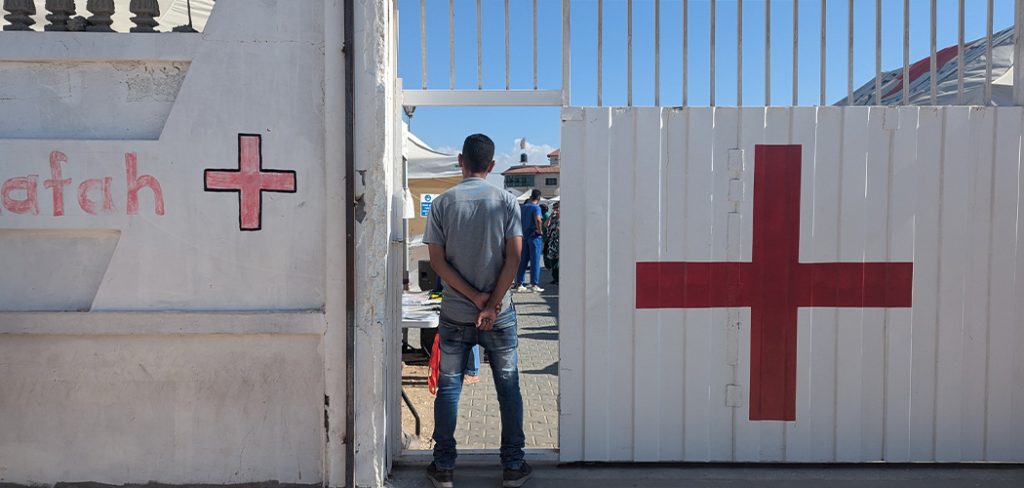
“Over the last one to two months the field hospital has experienced a surge in mass casualty incidents, many patients have been reported being wounded and injured while on their way to seek aid at nearby distribution sites. Hospital staff have logged more than 200 deaths over this period.”
Disregard for International Humanitarian Law
In his last deployment to Gaza, there were brutal killings of 15 medical and humanitarian personnel, eight of which were medics for the Palestinian Red Crescent Society.
“We have lost ICRC staff and Palestinian Red Crescent National Society staff and volunteers in this conflict. It’s incredibly distressing because these are staff and volunteers that are essentially risking their own lives to provide the support to others.”
Jean-Philippe says he would normally garner reassurance from the principles of humanitarian assistance and the protection that is afforded to healthcare workers and hospitals under the Geneva Convention and International Humanitarian law.
“It’s quite scary, and it’s not just in this context. We’re seeing around the world increasingly that there’s a breakdown of that protection, and the respect for IHL is being degraded; and we’re seeing attacks on medical facilities and we’re seeing a politicization of aid.”
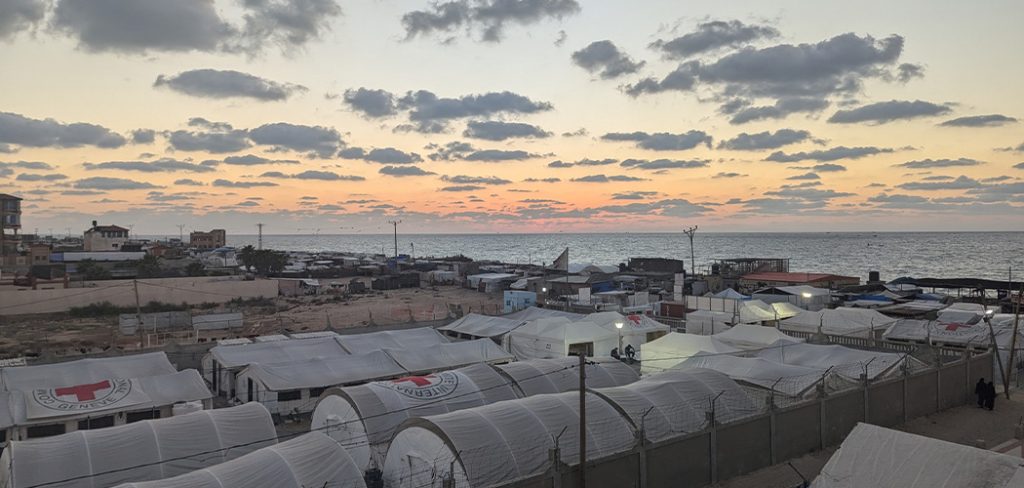
The provision of humanitarian aid and unimpeded humanitarian access is of the utmost importance, says JP. “International humanitarian law, known also as the laws of war, exists to limit suffering in times of armed conflict, must be respected and followed by all parties —especially when it comes to the protection of healthcare facilities and civilians.”
Red Cross along with other humanitarian organisations and the United Nations is calling for aid to be distributed in a safe and dignified manner at scale and in accordance with humanitarian principles. “The current aid that’s coming in is not meeting the needs of the population. It’s grossly insufficient,” says Jean-Philippe.
What nurses and midwives can do
As far as what nurses can do from afar, Jean-Philippe says to support organisations, campaigns and emergency appeals that share their values and their principles. Only donate to trusted independent humanitarian groups like Australian Red Cross, IFRC , Save the Children, UNICEF, etc, organisations that have a track record in providing healthcare in conflict zones.
“There are a lot of donation campaigns, including through GoFundMe, that lack oversight and transparency, and you can’t guarantee where or how those donations will be used.
“I’m running my own Australian Red Cross appeal page. That’s something I do when I’m home, because when I’m home, I’m an observer.”
Like many ANMF members have voiced, Jean-Philippe experiences feelings of helplessness and despair with what’s happening in Gaza.
“The pull to go back is that it changes that dynamic for me that I’m no longer an observer, but I’m an active participant and I can help save lives, I can help alleviate suffering. Although we can’t do everything that we want and we haven’t got all the resources that we need, it’s incredibly important and valuable to provide care and support.”
It’s also important not to dismiss the small actions and the weight these carry, whether that be talking to friends and if you have a platform, use it to advocate and raise awareness, stay informed, but set your own boundaries, says Jean-Philippe.
“You can send a message to your local MP or your union about your concerns or skip a few coffees, donate a few dollars. Find an act that connects you with your values and your profession and your humanity. Those small acts can help build solidarity and humanity can grow from there.”
Jean-Philippe maintains contact with his colleagues in Gaza to check in. “There’s nothing I can say or do from here that’s going to make anything better, but I reach out to them, and I tell them to stay strong, that I’m proud of the work that they’re doing, and that I haven’t forgotten them. It seems grossly insufficient given the gravity of the situation. But I think it’s something small that is appreciated and is just an example of how the small things can help.”
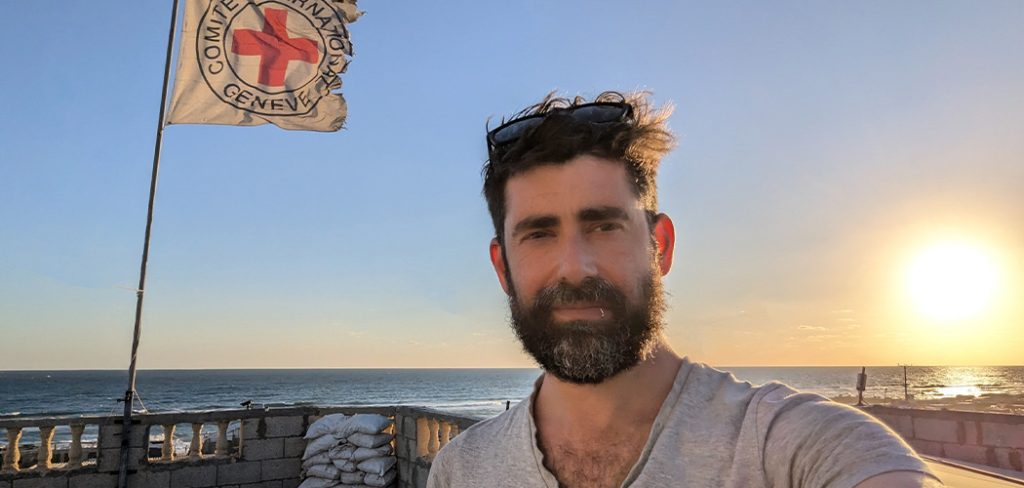
Coming back is always difficult and, in a way, more difficult than when in Gaza, he says. “There’s this discordance when you return. I very much leave my heart in Gaza, and I return home and it’s trying to transition to some normality again. There is no doubt feelings of guilt that you are returning to this peaceful country, and you’re very much aware of the setting that you’re leaving. It’s also a very difficult thing to explain to colleagues and friends about what you’ve experienced.”
Jean-Philippe plans to return with the ICRC in August.
Donate to Jean-Philippe Miller’s Australian Red Cross appeal page here


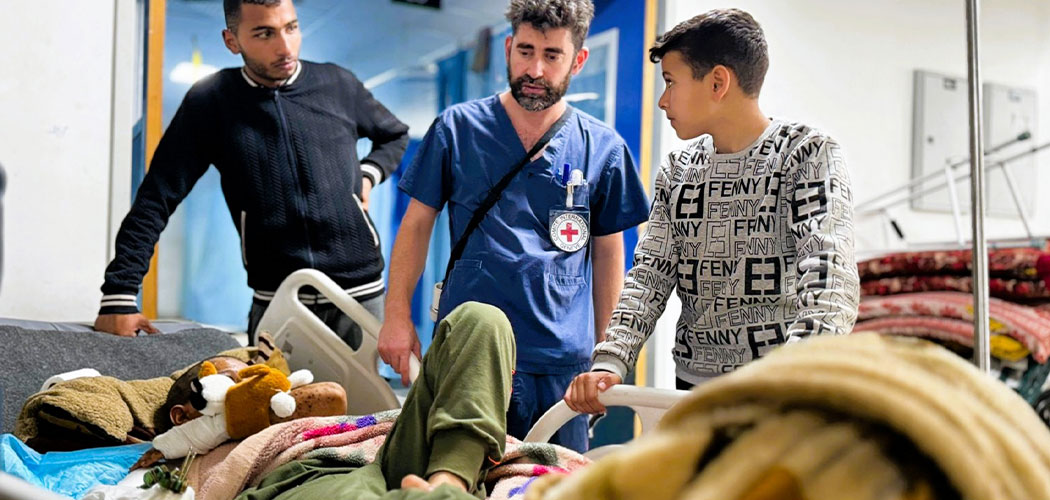






One Response
Those volunteers like Jean-Philippe just have my total support and admiration. What they do is crucial and I cry at what I think they must be seeing. Good luck, take care. Bill